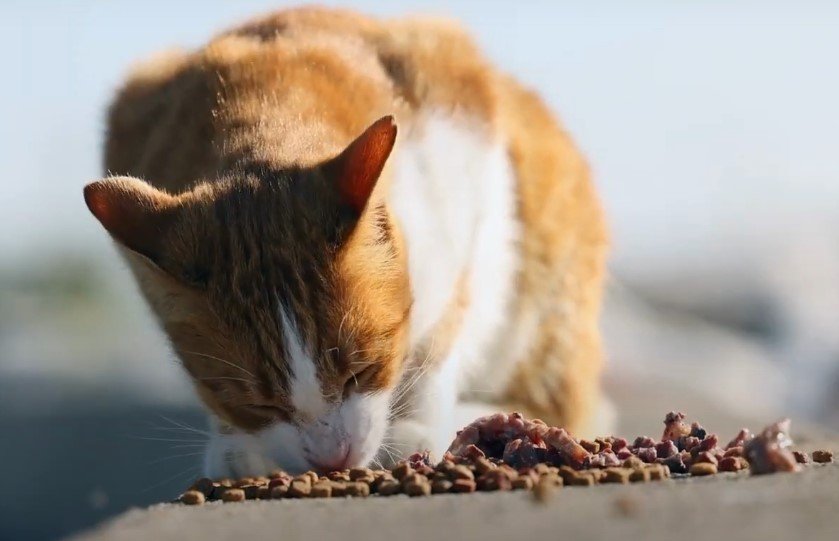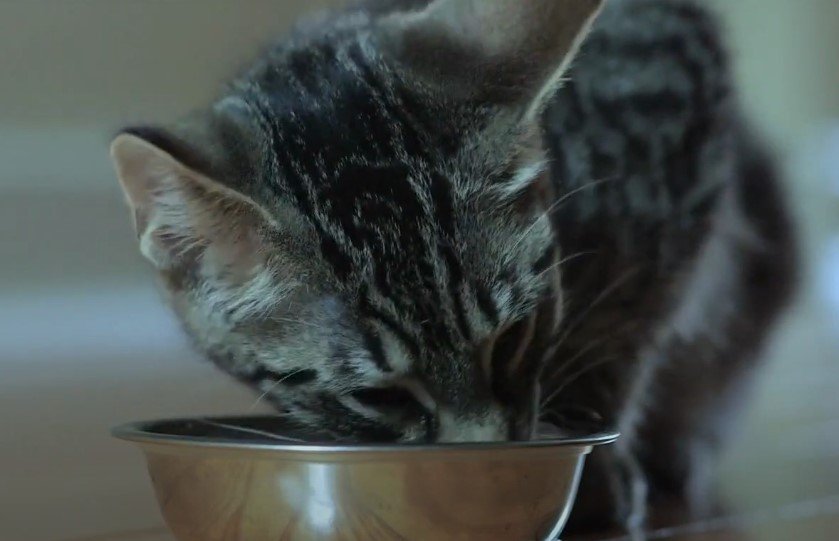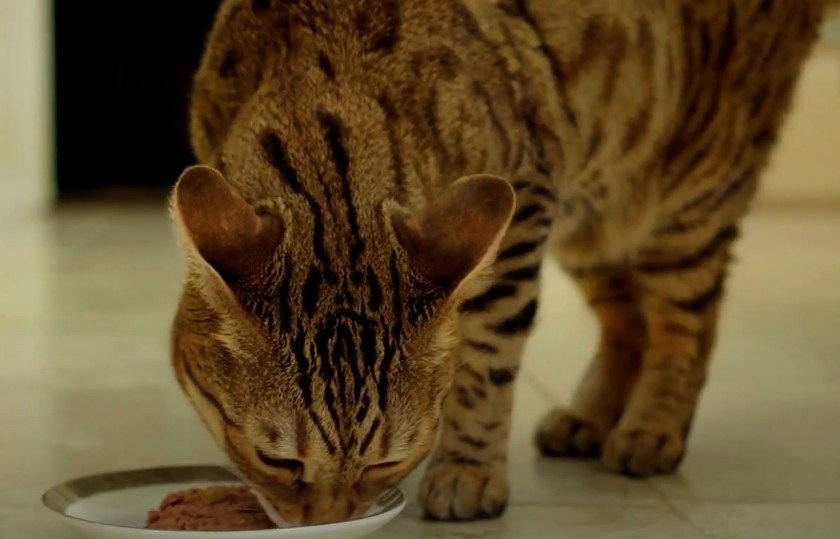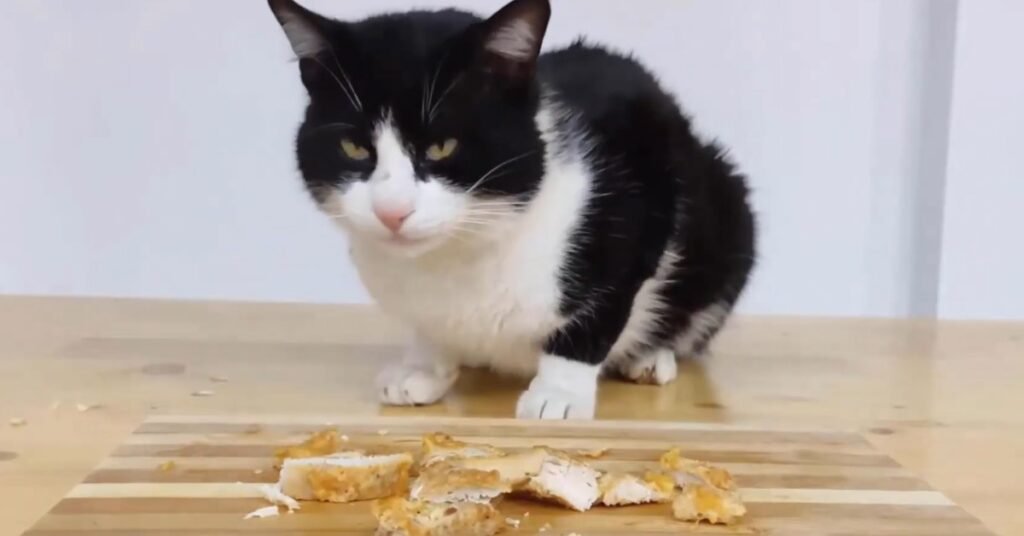
Cats can get food poisoning from chicken if it is raw, spoiled, or contaminated. Raw or spoiled meat can contain harmful bacteria like Salmonella, Campylobacter, and Listeria, and even if they eat a small amount of bad meat, they may experience vomiting, diarrhea, and dehydration.
Raw chicken carries the highest risk, as it can contain harmful pathogens. Cooked chicken is safer, but improper storage or seasoning can still make it unsafe. Food poisoning can lead to infections or long-term health issues if not treated quickly.
So, how do you protect your cat? Understanding the risks and safe feeding practices is key. Keep reading. We’ll explore the causes, symptoms, and best ways to protect your cat from chicken-related food poisoning.
Understanding Food Poisoning in Cats
Cats are obligate carnivores. So, their bodies are designed to process raw meat, but there are still limits to what they can consume safely. If meat spoils or isn’t cooked or stored properly, it may contain harmful microbes or toxic substances.
If cats eat spoiled or contaminated meat, they may get food poisoning. This can upset their stomach and make them sick.
In severe cases, food poisoning can lead to dehydration, organ failure, or infections that spread through the bloodstream.
Risks of Chicken-Related Food Poisoning in Cats
Here are the risks of chicken-related food poisoning in cats:
1. Bacterial Infections
Raw or undercooked chicken can carry harmful bacteria like:
- Salmonella – Causes vomiting, diarrhea, and fever.
- Campylobacter – This leads to stomach pain, dehydration, and weakness.
- Listeria can trigger fever, muscle pain, and digestive issues.
Cats with weak immune systems are at a higher risk of severe illness.
2. Foodborne Parasites
Raw chicken may contain parasites such as:
- Toxoplasma gondii can cause lethargy, fever, and loss of appetite.
- Tapeworms lead to weight loss and digestive problems.
Cooking chicken properly kills these parasites and makes it safer.
3. Spoiled Chicken Poisoning
Old or improperly stored chicken can harbor harmful bacteria. Eating spoiled meat can lead to the following:
- Severe vomiting and diarrhea
- Painful stomach cramps
- Risk of deadly infections
4. Avian Influenza (Bird Flu) Risk
In rare cases, raw chicken can carry bird flu viruses like H5N1. Cats that eat infected meat may develop respiratory distress, fever, and lethargy.
5. Nutritional Imbalances
Feeding only chicken can lead to deficiencies. Cats need taurine, calcium, and essential vitamins for strong bones, healthy muscles, and a balanced diet.
6. Cross-Contamination Risk
Handling raw chicken can spread bacteria to:
- Your hands
- Kitchen surfaces
- Other foods
Causes of Chicken-Related Food Poisoning in Cats
Here are the main causes of chicken-related food poisoning in cats:
1. Bacterial Contamination
Raw or undercooked chicken can carry harmful bacteria. The most common ones are:
- Salmonella – Causes vomiting, diarrhea, and fever.
- Campylobacter – This leads to stomach pain, dehydration, and weakness.
- Listeria can trigger fever, muscle pain, and digestive issues.
2. Spoiled Chicken
If chicken is left out for too long, bacteria multiply fast. Spoiled chicken smells bad and can make your cat very sick.
3. Improper Handling
Handling raw chicken and then touching your cat can spread bacteria. Germs can also come from unwashed knives, dirty cutting boards, and hands.
4. Raw Chicken Diets
Cats can eat raw chicken, and many pet owners offer it, believing it’s a natural diet. However, raw meat carries a high risk of bacterial infections, such as Salmonella and E. coli. Cook chicken properly to make it safer.
5. Parasites
Some raw chicken contains parasites like Toxoplasma gondii, Tapeworms, Trichinella spiralis, and Eimeria spp.. These can cause infections, leading to vomiting, diarrhea, and weakness.
6. Preservatives and Additives
Some store-bought chicken contains chemicals to stay fresh. Some common preservatives and additives found in store-bought chicken are Sodium Tripolyphosphate (STPP), Monosodium Glutamate (MSG), Sodium Nitrate/Nitrite, BHA (Butylated Hydroxyanisole) & BHT (Butylated Hydroxytoluene), and Potassium Lactate. These can upset a cat’s stomach or cause allergies.
7. Cross-Contamination
If raw chicken touches other foods, bacteria can spread. Even clean-looking surfaces may carry germs that can infect your cat.
8. Avian Influenza (Bird Flu)
In rare cases, chickens can carry bird flu viruses like H5N1. Eating infected meat can make cats very sick.

Symptoms of Chicken-Related Food Poisoning in Cats
Cats can show different signs if they eat spoiled or contaminated chicken. Knowing the symptoms of food poisoning is important. Here are some common symptoms:
1. Vomiting – Frequent vomiting is a red flag.
2. Diarrhea – This can lead to dehydration.
3. Loss of Appetite – A sick cat may refuse to eat.
4. Lethargy – Your cat may seem weak, tired, or uninterested in usual activities.
5. Dehydration – Dry gums, sunken eyes, and reduced urination are warning signs.
6. Abdominal Pain – Your cat may curl up, and not want to move or react when touched on the belly.
7. Fever
8. Shivering or Tremors
9. Difficulty Breathing
10. Excessive Drooling
Treatment of Chicken-Related Food Poisoning
Food poisoning from chicken can be serious for cats. Quick treatment is key to recovery. Here’s what to do.
1. Remove the Contaminated Food
Take away any leftover chicken immediately. Do not let your cat eat more of it.
2. Keep Your Cat Hydrated
Food poisoning can cause vomiting and diarrhea, which can lead to dehydration. Provide fresh water at all times. If your cat refuses to drink, offer a vet-approved electrolyte solution.
3. Let the Stomach Rest
Do not feed your cat for 6–12 hours to allow their digestive system to recover.
4. Introduce Bland Food Slowly
Once vomiting stops, offer small amounts of plain boiled chicken or white rice. Avoid seasonings, oils, and dairy.
5. Monitor for Symptoms and Contact a Vet
Watch for signs like vomiting, diarrhea, fever, or weakness. Seek vet help immediately if your cat shows severe symptoms such as:
- Continuous vomiting or diarrhea
- Extreme lethargy or collapse
- Blood in stool or vomit
- Dehydration (dry gums, sunken eyes, low energy)
6. Veterinary Treatment Options
A vet may provide:
- Fluids – To treat dehydration.
- Medications – To control vomiting and diarrhea.
- Antibiotics – If a bacterial infection is present.
- Hospitalization – In severe cases, for intensive care.
How to Prevent Chicken-Related Food Poisoning in Cats
Keeping your cat safe from food poisoning starts with proper food handling. Here’s how to prevent it.
1. Always Cook Chicken Thoroughly
Raw or undercooked chicken may contain harmful bacteria like Salmonella and Campylobacter. To kill germs, cook chicken to at least 165°F (74°C).
2. Avoid Feeding Spoiled Chicken
Never give your cat chicken that smells bad or looks slimy. Store raw chicken in the fridge and use it before it expires.
3. Keep Raw and Cooked Meat Separate
Cross-contamination can spread bacteria. Use clean utensils, cutting boards, and bowls when preparing chicken for your cat.
4. Wash Hands and Surfaces
Always wash your hands and kitchen surfaces after handling raw chicken. This prevents bacteria from spreading to your cat’s food.
5. Store Chicken Properly
Keep raw chicken in the fridge at 40°F (4°C) or lower. If not used within two days, freeze it to prevent spoilage.
6. Avoid Seasonings and Additives
Salt, garlic, onions, and certain spices can be toxic to cats. Feed only plain, unseasoned chicken.
7. Don’t Leave Food Out Too Long
Bacteria grow fast at room temperature. Throw away leftover chicken after 30 minutes to keep it safe.
8. Be Cautious with Raw Diets
Raw diets carry a higher risk of bacterial infections. If feeding raw, consult a vet to ensure safe handling and preparation.
9. Provide Fresh Water
Clean drinking water helps flush out toxins and supports digestion.
10. Monitor Your Cat’s Health
If your cat shows signs of food poisoning, seek veterinary help immediately.

Alternative Protein Sources For Cats
Cats need protein to stay healthy. Meat is their main source, but there are other options too. If your cat has allergies or dietary restrictions, or you want variety, consider these protein alternatives.
| Fish | Fish like salmon, tuna, and sardines are rich in protein and omega-3s. They support skin, coat, and joint health. Avoid raw fish and limit mercury-rich options like tuna. |
| Turkey | Lean and packed with protein, turkey is a great alternative to chicken. Always cook it plain—no seasoning, onions, or garlic. |
| Beef | Beef is rich in iron and B vitamins. Choose lean cuts and cook them well to kill bacteria. Avoid fatty or processed meats. |
| Duck | Duck is a good choice for cats with poultry allergies. It has a unique taste and provides essential amino acids. |
| Lamb | Lamb is high in protein and healthy fats. It’s great for cats needing weight gain or energy boosts. Introduce it slowly to avoid stomach issues. |
| Eggs | Eggs are an excellent protein source and easy to digest. Cook them fully to eliminate bacteria like Salmonella. |
| Quail | Quail is a novel protein option, perfect for cats with food sensitivities. It’s nutrient-dense and a great alternative to common meats. |
| Insects | Grasshoppers and mealworms are high in protein and sustainable. Some pet foods now use insect proteins. |
| Plant-Based Proteins | While cats need animal protein, some plant sources, like pea protein and lentils can supplement their diet. These should never replace meat, but can add variety. |
| Commercial Hypoallergenic Diets | If your cat has allergies, vet-approved hydrolyzed protein diets can help. These break down proteins for easier digestion. |
Remember, introduce new proteins gradually to avoid stomach upset, cook meat thoroughly, and watch for allergies like itching, vomiting, or diarrhea.
Conclusion
Cats can get food poisoning from chicken. Although they usually digest it well, it must be fully cooked and free of bacteria. Raw or spoiled chicken can cause severe health problems.
To keep your cat safe, always choose fresh, properly prepared food. If you’re unsure about your cat’s diet, check with a vet.
FAQ
1. Can Cats Recover From Food Poisoning on Their Own?
Mild food poisoning in cats may resolve within 24–48 hours if they stay hydrated and eat small amounts. However, if vomiting, diarrhea, or weakness persist, veterinary care is necessary.
2. Can cats get food poisoning from cooked chicken?
Yes, cats can get food poisoning from cooked chicken if it is spoiled, contaminated, or improperly stored. Bacteria like Salmonella and Listeria can still be present if the chicken was left out too long or not cooked thoroughly. Always serve fresh, fully cooked chicken without seasoning to keep your cat safe.
3. How do you flush poison out of a cat’s system?
If you suspect poisoning, seek veterinary help immediately. Do not induce vomiting without a vet’s advice. Provide fresh water to prevent dehydration and remove any toxic food. A vet may use fluids, activated charcoal, or medications to flush out toxins safely.
4. Can cats get sick from eating raw chicken?
Yes, cats can get sick from eating raw chicken. Raw chicken may contain harmful bacteria like Salmonella or Campylobacter, which can cause stomach issues, vomiting, or diarrhea. It can also carry parasites that affect your cat’s health. Cooking chicken kills these harmful germs, making it safer for your cat.
5. How to tell if your cat is unwell?
Signs Your Cat Is Unwell
- Eating less or drinking more signals illness.
- Struggling to pee, diarrhea, or constipation needs vet care.
- Hiding or low energy often means pain.
- Fast, noisy, or heavy breathing is serious.
- Dirty fur or bald spots show health issues.
- Sudden weight loss or gain can mean disease.
- Watery eyes, sneezing, or mucus need attention.
6. Can cats get sick from eating old chicken?
Yes, cats can get sick from eating old chicken. Spoiled chicken can contain harmful bacteria like Salmonella, Campylobacter, and Listeria, leading to vomiting, diarrhea, and dehydration.

